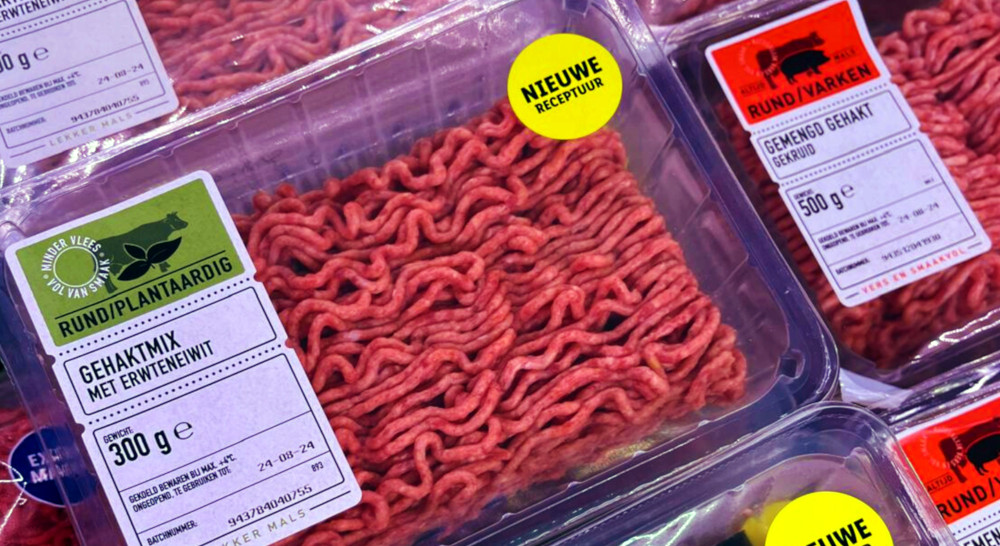European retail giant Lidl has launched a new
product for the Dutch market that combines 60 percent minced beef with 40
percent pea protein — claiming to be the first supermarket in the country to
offer a partly plant-based minced meat option.
The new product, now available in all Lidl stores across the
Netherlands, aims to reduce environmental impact — the hybrid
minced-meat mix has a 37.5 percent lower carbon footprint than beef
mince — while providing customers with the familiar taste of beef at a lower
cost: Lidl is selling 300-gram packages of the meat blend for €2.29 — 33
percent cheaper than traditional ground beef.
Lidl says it opted for an innovation in minced meat because of its popularity:
Half of the Dutch eat minced meat every week, according to the Future of Food
Institute.
It is also a popular product among families with children.
 Image credit: Lidl
Netherlands
Image credit: Lidl
Netherlands
“I am proud of the product we have developed: a classic meat product in a new
guise,” says Lidl buyer Geert de
Vries. “With this
minced-meat mix, you can make the most delicious pasta Bolognese — but also a
classic meatball. The taste is the same, but the environmental impact and price
are lower. The development took quite a while. We wanted to develop a
minced-meat mix that contains less meat but retains the taste. I dare say that
even for the real meat lover, this minced-meat mix is indistinguishable from
regular minced meat.”
Price reduction in plant-based basic groceries
Lidl has set a target of having plant-based proteins represent 60
percent of its protein sales by 2030. In addition to this initial hybrid meat
offering, the retailer has also instituted a permanent price reduction on
plant-based basic groceries — including meat substitutes and dairy substitutes
such as plant-based quark, yogurt, cheese and oat fraîche — which now cost equal
to or less expensive than their animal-based counterparts, so that price is
never an obstacle for shoppers to make the more sustainable choice.
"Lidl is taking two important steps.,” says Martine van
Haperen, Health and
Nutrition expert at Proveg Netherlands. “Price is the main obstacle for
people to choose plant-based more often. The step to make plant-based products
the same price or cheaper than meat and dairy removes that obstacle.
“Also, not everyone wants to eat meat
substitutes
or legumes. By introducing a hybrid product, just in the meat section, they
really appeal to the meat eater — they don't even have to change their
consumption pattern. This is a valuable addition that really gives Lidl the
opportunity to influence the protein ratio.”
Changing customer habits
A shift toward more plant-based diets is happening around the world — with
significant growth in plant-based food sales seen in Latin
America,
Asia
and the US. Between 2020 and 2022,
plant-based food sales also increased by 20 percent across
Europe;
roughly a quarter of European
shoppers
will choose at least one dairy alternative and one meat alternative during their
regular grocery shop. With Dutch consumers, in particular, research found an
increased willingness to try new food products, such as cultured
meat;
and sales of meat alternatives in food service in the Netherlands more than
doubled
between 2021 and 2023.
“We are delighted that Lidl is choosing to actively promote plant-based foods by
both reducing the prices of the products and by creating a blended minced meat
that cuts the CO2 of fully minced meat,” says Jasmijn de
Boo, global chief executive at
ProVeg International — a food-awareness organization with
the mission to replace 50 percent of animal products globally with plant-based
and cultivated foods by 2040, which previously collaborated with Lidl on social
media campaigns to promote plant-based alternatives.
“Shifting to more plant-based diets is vital if we are to successfully stabilize
CO2 emissions and halt habitat and biodiversity loss around the world.
Supermarkets play a huge role here and Lidl has shown what can be done to
encourage this shift. We urge other supermarket chains to compete with Lidl with
their promotion of plant-based foods.”
With this plant-based push, Lidl joins other European retailers taking creative
measures to encourage healthier and climate-impact-reducing shopping choices: In
2022, Danish retailer Coop
began an ambitious effort to reduce 50 percent of its Scope 3 emissions linked
to the manufacturing of food via customer behavior change. One pilot involved
labeling 2,200 of the most climate-friendly
products
in stores to show customers the “most impactful” climate choices across a number
of popular product categories. Through the “climate journey” through the store —
which included nudges for shoppers to purchase, for example, “more green and
less red meat” and other climate-friendlier choices — Coop reported a remarkable
14 percent reduction in the overall climate impact of shopping choices across
all categories in six months, as well as a 67 percent reduction in food
waste.
Get the latest insights, trends, and innovations to help position yourself at the forefront of sustainable business leadership—delivered straight to your inbox.
Sustainable Brands Staff
Published Aug 29, 2024 8am EDT / 5am PDT / 1pm BST / 2pm CEST